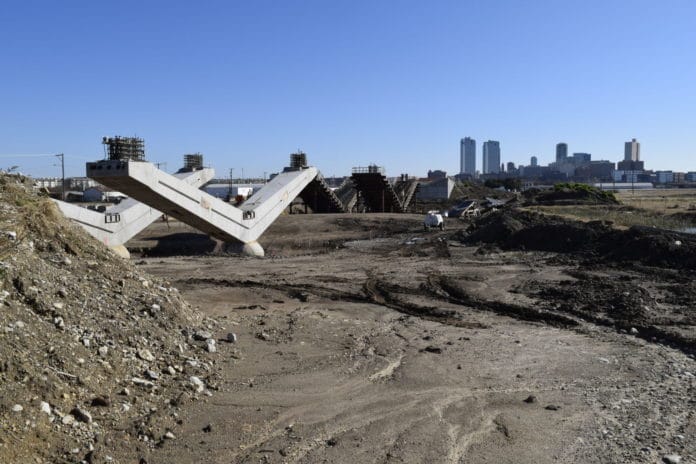Tarrant Regional Water District officials expect to tap funds from the $250 million bond issue approved by voters last year to keep the $1.16 billion Panther Island project on track.
With only about $13 million remaining unspent from $200 million the TRWD loaned the project, officials are scrambling for financing solutions to prevent the project from stalling.
“We have enough money to stretch through the fiscal year and are not looking to issue bonds or commercial paper at this time,” TRWD Finance District Sandy Newby told the TRWD board on Feb. 19.
Two weeks earlier, Newby floated the idea of issuing bonds or commercial paper to the Trinity River Vision Authority board, an offshoot of the TRWD and the agency overseeing the project.
Commercial paper and bonds are both short-term financing options.
She told the TRVA board that the loan money was projected to run out before the end of the fiscal year, probably by mid-year.
The Panther Island financing arrangement is built on a combination of federal and local funds, with local funds coming from the city of Fort Worth and Tarrant County, partners with TRWD and TRVA in the project.
The U.S. Army Corps of Engineers has authorized $526 million to be spent on the Panther Island project. The funds would go toward digging a 1.5-mile Trinity River bypass channel north of the Tarrant County Courthouse, a strategy that would bolster flood control protection as well as carving out an 800-acre center island and create waterfront economic development opportunities.
But the project has failed to receive the amount of federal appropriation it is relying on to carry out the ambitious plan. The cost for the project has escalated during the past 14 years from an initial estimate of $360 million to the current level of $1.16 billion.
Opponents of the project refer to it as “The Boondoggle” due to its escalating cost.
But the biggest challenge now is financing. A federal appropriation of $26 million is needed in 2020 and another $35 million is required in 2021 to keep the project on schedule for completion in 2028, according to TRWD officials.
While U.S. Rep. Kay Granger, R-Fort Worth, the project’s top advocate in Washington, D.C., continues to push for a federal appropriation, some local leaders have raised alarm about securing the federal funds.
Fort Worth Mayor Betsy Price, who meet with federal Office of Management and Budget officials during a trip to Washington last fall, reported that she was told the project didn’t qualify for Corps funds, despite the authorization, because the project is economic development endeavor as well as flood control protection.
At the request of Price and the city, the TRWD board approved a comprehensive “programmatic” review of the project to determine whether management add oversight, the scope of the project or other local issues might be contributing to its failure to attract new federal funds.
Nearly $322 million in local funds has already been invested in the project along with about $108 million from various federal agencies. But only $60.5 million has come from the Corps budget.
TRWD officials are counting on tapping the $250 million in bonds approved by voters to continue progress on the project.
But the financing strategy to tap the bond funds is tied to extending a tax incrementing financing district (TIF) from 40 to 50 years.
The city created the TIF and would be the agency that would decide whether to extend it 10 years.
A TIF is a funding mechanism to capture tax revenue from new development and rising property value within a fixed boundary district. That additional tax revenue would repay the bonds over the lifetime of the TIF, which in this case would be 50 years if the extension is approved, officials said.
City officials have indicated that “extending the TIF won’t be considered until after the programmatic review is complete,” said TRWD Executive Director Jim Oliver.
The review was put on an expeditious three-month schedule but has already suffered a setback. Only one bidder submitted a proposal to conduct the review. The TRVA board identified and notified about a dozen nationally-recognized firms of the opportunity to bid.
Between five and eight firms sent representatives to a mandatory meeting in January.
The lone bidder is Riveron, a Dallas-based consulting firm, the Fort Worth Business Press has learned.
Tarrant County Administrator G.K. Maenius, who is also president of the TRVA board, said earlier in February that the proposal for bidders may have to reconsidered to attract more bidders.
But TRWD officials said negotiations are underway with the lone bidder to revise the scope of its bid and reduce its cost.
All information about the bid was stamped proprietary so TRVA and TRWD officials said they are barred from releasing any details, including the name of the bidder.
No amount of the money was budgeted for the review, leaving it to the discretion of bidders based on the scope of the work outlined in the bid.
Oliver said the bid was “heavy on (an) engineering” review.
“It was very expensive,” Oliver said.
The city has committed $26.6 million and Tarrant County has committed $11 million to the joint partnership project. Remaining local funds come from TIF tax revenue.
Meanwhile, three bridges being built to eventually connect Panther Island to the Fort Worth mainland are projected to be completed between 2020 and 2021 although that schedule remains in flux.






